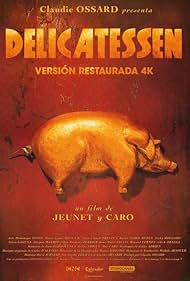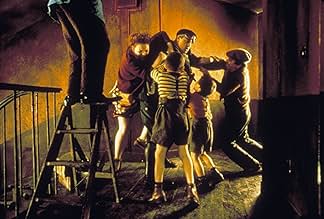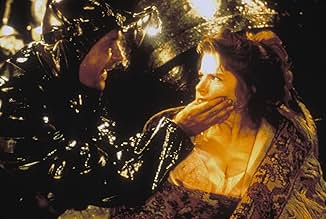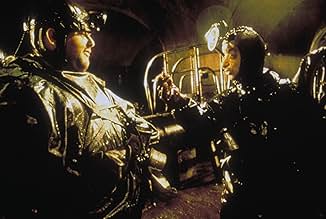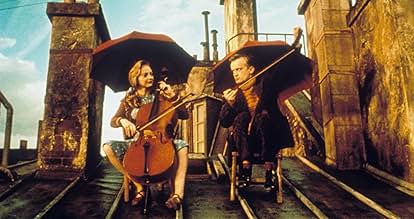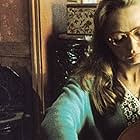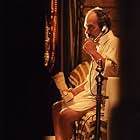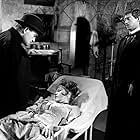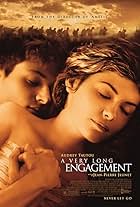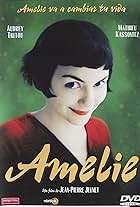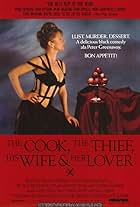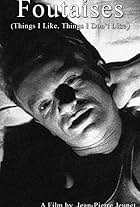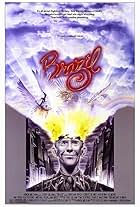CALIFICACIÓN DE IMDb
7.5/10
92 k
TU CALIFICACIÓN
Comedia negra surrealista y post-apocalíptica sobre el propietario de un edificio de apartamentos que ocasionalmente prepara manjares para sus extraños inquilinos.Comedia negra surrealista y post-apocalíptica sobre el propietario de un edificio de apartamentos que ocasionalmente prepara manjares para sus extraños inquilinos.Comedia negra surrealista y post-apocalíptica sobre el propietario de un edificio de apartamentos que ocasionalmente prepara manjares para sus extraños inquilinos.
- Nominada a1 premio BAFTA
- 15 premios ganados y 16 nominaciones en total
Mikael Todde
- Young Rascal
- (as Mikaël Todde)
Argumento
¿Sabías que…?
- TriviaJean-Pierre Jeunet got the idea for a cannibal butcher when living in an apartment above a butcher's shop. Each morning at 7am he would hear the metallic clash of knives and a voice shout, "Chop chop!" His girlfriend said he was carving up the neighbors, and it would be their turn next week.
- ErroresEvery time Julie plays the cello, the audio is behind what she plays. This is most visible in the first playing session when she is practising by playing C major up and down; the lag is several notes.
- Créditos curiososIn the opening credits, crew members' names appear on objects that the camera tracks across: the director of photography's name appears on a camera, the composer's name on a broken 12" record, etc.
- Bandas sonorasEntry of the Gladiators
Written by Julius Fucík
Opinión destacada
Jeunet and Caro, with the help of their familiar repertory of actors, create a deeply disturbing and violent world where only a few shreds of conventional social mores remain. These scraps of morality only serve to delineate more clearly the overall decline and collapse of their dystopia. We see a butcher's shop; the proprietor, played by Jean-Claude Dreyfus, is evil almost to the point of caricature. He only manages to survive by killing his lodgers when they get behind with the rent and selling them as meat. However, the situation is given an added twist when we learn that all the lodgers are aware of this; a woman who is sold a joint of mother sheds a couple of stifled tears and mutters she would have liked to have said goodbye. Similarly, the butcher is most apologetic when he accidentally chops off the foot of one of his clients who has paid his rent in full.
Into this hellish world is placed someone with his moral values relatively intact. In this case, it is a circus performer played by the marvellously rubber-faced Dominique Pinon. A less engaging actor might have made this character seem two-dimensional, as he appears to have no faults whatsoever (except a set of over-mobile lips). He enthrals the lodgers' children with his games, is immensely chivalrous to the butcher's daughter and plays the musical saw. Finally, an old edition of his act is broadcast on the flickering black-and-white television, and even the most bloodthirsty lodgers are amazed and delighted. The butcher's jealousy is roused; Good and Innocence is forced to fight Evil and Hatred.
As such, the plot is relatively straightforward. It is the sheer surrealistic imagination that Jeunet and Caro bring to their films that prevent them being unremittingly bleak or simple morality tales. They display a brilliant sense of musical timing- the whole building frequently becomes an orchestra of creaking bed-springs, croaking frogs, and crackling radios; above all this soars a love-duet of a cello and a musical saw. The faded `look' of the film complements this. With the exception of a single television remote control, nothing here would be out of place in in a exhibition of 40s and 50s design. In `The City of Lost Children' the exuberance of the design threatens to swamp the slender storyline on occasions; here, the more `grown-up' themes and less fantastic design go hand in hand.
(A word of warning about the video release- the subtitles appear to have been written be a couple of Frenchmen who really ought to have concentrated harder in their English classes at school. Apart from that, I wholeheartedly recommend this joyously grotesque film.)
Into this hellish world is placed someone with his moral values relatively intact. In this case, it is a circus performer played by the marvellously rubber-faced Dominique Pinon. A less engaging actor might have made this character seem two-dimensional, as he appears to have no faults whatsoever (except a set of over-mobile lips). He enthrals the lodgers' children with his games, is immensely chivalrous to the butcher's daughter and plays the musical saw. Finally, an old edition of his act is broadcast on the flickering black-and-white television, and even the most bloodthirsty lodgers are amazed and delighted. The butcher's jealousy is roused; Good and Innocence is forced to fight Evil and Hatred.
As such, the plot is relatively straightforward. It is the sheer surrealistic imagination that Jeunet and Caro bring to their films that prevent them being unremittingly bleak or simple morality tales. They display a brilliant sense of musical timing- the whole building frequently becomes an orchestra of creaking bed-springs, croaking frogs, and crackling radios; above all this soars a love-duet of a cello and a musical saw. The faded `look' of the film complements this. With the exception of a single television remote control, nothing here would be out of place in in a exhibition of 40s and 50s design. In `The City of Lost Children' the exuberance of the design threatens to swamp the slender storyline on occasions; here, the more `grown-up' themes and less fantastic design go hand in hand.
(A word of warning about the video release- the subtitles appear to have been written be a couple of Frenchmen who really ought to have concentrated harder in their English classes at school. Apart from that, I wholeheartedly recommend this joyously grotesque film.)
- praemius
- 15 sep 2000
- Enlace permanente
Selecciones populares
Inicia sesión para calificar y agrega a la lista de videos para obtener recomendaciones personalizadas
- How long is Delicatessen?Con tecnología de Alexa
Detalles
Taquilla
- Presupuesto
- FRF 24,000,000 (estimado)
- Total en EE. UU. y Canadá
- USD 1,803,257
- Fin de semana de estreno en EE. UU. y Canadá
- USD 4,733
- 5 abr 1992
- Total a nivel mundial
- USD 1,804,142
- Tiempo de ejecución1 hora 39 minutos
- Color
- Relación de aspecto
- 1.85 : 1
Contribuir a esta página
Sugiere una edición o agrega el contenido que falta

Principales brechas de datos
By what name was Delicatessen (1991) officially released in India in English?
Responda